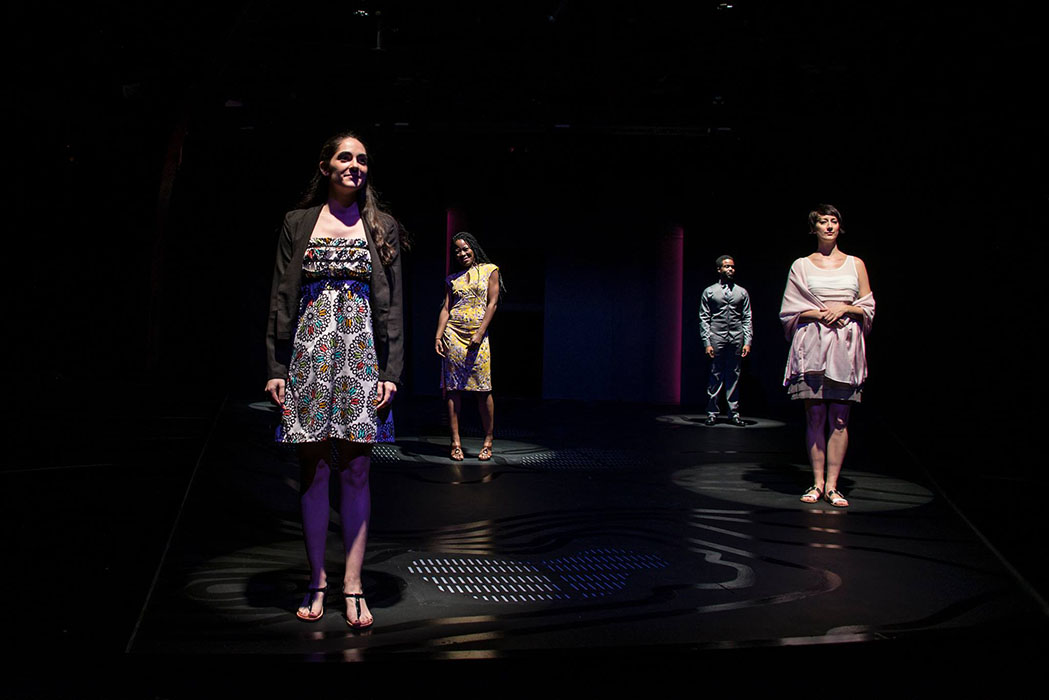As way of preface, the strangers was commissioned by the Clarence Brown Theatre from playwright Christopher Oscar Peña for performance by eight of the UT Department of Theatre MFA acting candidates. The work was developed over a two year period by the playwright, the actors, and faculty director John Sipes, along with designers and staff.
Peña has offered that an initial idea for the play was something along the lines of Thornton Wilder’s Our Town in painting a portrait of a specific place in time. “But where were all the people of color?” – he asks in his program notes. “Where were the immigrants? Where were all the Queer characters? Why did we only ever hear one language? What fantasy life was this?”
Peña’s place in time is contemporary America—an America of accelerating change, an America of diversity of national origins, races, and sexual identities. “This play,” explains Peña, “aims to paint a portrait of America today, and more importantly, to give voice to people you don’t often see on stage and on screen.”
Of course, portraits are merely snapshots in time. Things that may have been shocking five or ten years ago, are daily news today. If the strangers has a fault, it is the dramatic naiveté—or perhaps presumption—of believing that the universal truths of love, sex, hate, jealousy, and the human struggle are somehow shocking and new to contemporary society. Details of the American portrait may change, colors may change, personal relationships may change, cultural expressions may change—the basic concepts of human existence do not. And, yes, there is always a looming apocalypse.
The eight actors—character names, like the title the strangers, given suggestively in lower case—take a variety of multiple roles in the play’s loosely interwoven series of episodes that cut across societal cubbyholes. Those episodes surround the quasi-autobiographical character of “cris” (Aaron Orlov), a gay Hispanic man who has returned to his old town. His guide, “dave” (Jeff Dickamore), is something of an enigma until he just happens to reveal his own sexuality and they become lovers. There’s a homeless woman (Emily Kicklighter) and, ripped from the headlines, a woman encouraged into suicide (Carlène Pochette) by a manipulative lover (Lauren Pennline). Miguel A. Faña is “diego,” cris’ straight brother brought to a crisis by a gay wedding. Charlotte Munson is southern belle wedding planner and a shallow teenager. Jude Carl Vincent is “niegel”, et al.
There are two outstanding monologues among the outstanding ensemble episodes: one by Orlov’s “cris” that opens “act ii” and defines the play’s autobiographical slant; and one by Kicklighter as the homeless (wo)man, a performance that was simply entrancing and illuminating. Truly, though, the strangers is a talent showcase for all eight of these marvelous actors who are completing their MFA years at UT.
I just know there was a visual metaphor lurking in costume and scenic designer Andrea Lauer’s thrust arrangement which featured deliberately thick doors on either side of an an ominous central hatch-like portal that opened and closed vertically. Ominous, too, was the dark blue-gray walls and floor pierced with urban-ish grates.
Although the theatre has been diligent in warning that the production contains adult content and language, I shouldn’t worry too much. Our threshold for surprise and shock has come a long way from Grover’s Corners.









Alan, what an extremely well written review, particularly your opening and closing references to Thornton Wilder’s “Our Town.” Superb job.
Thank you.